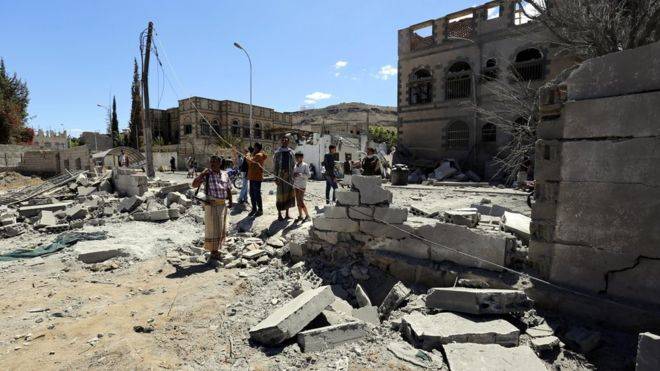SANAA - A Saudi-led air coalition airstrike on a market northeast of the rebel-held Yemeni capital Sanaa killed at least 30 rebels and civilians, witnesses said.
The air strike targeted three rebel vehicles as they entered a market in the town of Naqil bin Ghaylan, killing at least 30 Huthi insurgents and civilians, one tribal source in the area said.
The rebel-controlled Saba news agency gave a higher death toll, saying that 60 civilians were killed and wounded in the attack but it did not mention any casualties among fighters. The attack hit Khulaqa market, which is known for selling qat, a mild narcotic that is chewed throughout Yemen, witnesses said.
The area is part of the Nehm region, where coalition-backed loyalists have been advancing against the rebels as they try to close in on Sanaa. Rights groups have repeatedly urged the coalition to avoid causing civilian casualties.
Earlier this month, Human Rights Watch accused the coalition of using US-supplied cluster bombs. The coalition last month announced that an independent inquiry would examine charges of possible abuses against civilians in the conflict. A panel of UN experts says the coalition has carried out 119 sorties that violated humanitarian law, and called for an international probe.
The coalition launched late March 2015 an air campaign against Iran-backed rebels in support of the UN-recognised President Abedrabbo Mansour Hadi. The Iran-backed Shiite rebels have controlled Sanaa since September 2014 and had placed Hadi under house arrest.
But he escaped, intially seeking refuge in second city Aden last year before fleeing to the Saudi capital, Riyadh, as the rebels advanced on the southern port. Hadi returned to Aden after loyalists backed by the coalition drove the rebels out of there and four other southern provinces in the summer.
But Hadi and senior officials continue to spend most of their time in Riyadh against a backdrop of worsening security in Aden, the temporary base of the government.
The United Nations warned this month of a ‘human catastrophe unfolding in Yemen’, where it says more than 6,100 people had been killed in the fighting since last March. The UN said another 3,000 people had been wounded and 2.5 million people forced to flee their homes.
Donors at a conference in Qatar pledged Wednesday $220 million of aid to Yemen. Hadi’s government accused this week Lebanon’s Hezbollah of sending fighters to support the Huthis, saying it had evidence of the Shiite militia’s involvement. Also on Saturday, the United Arab Emirates, a key member of the Saudi-led coalition, said that one of its soldiers has died in Yemen when his military vehicle overturned. The UAE has lost more than 70 soldiers in Yemen since the launch of the campaign.
Moreover, the United Arab Emirates said Saturday that one of its soldiers has died in Yemen, where a Saudi-led coalition is helping government forces against Iran-backed rebels. Soldier Mohammed al-Dhahnani died ‘in an accident when his military vehicle overturned while performing his national duty’ during coalition operations, the armed forces said in a statement carried by state news agency WAM.
It did not provide further details on the accident. On Sunday, the UAE announced the death of another soldier, Obeid al-Bedwawi, in a similar accident in Saudi Arabia, where some UAE forces taking part in Yemen operations are stationed. The UAE has lost more than 70 soldiers in Yemen since the Arab coalition launched its military campaign in support of President Abedrabbo Mansour Hadi’s internationally-recognised government in March. In the meanwhile, Unidentified gunmen shot dead Friday a senior Yemeni intelligence officer in Aden, the violence-hit southern port city serving as a base for the Saudi-backed government, a security official said.
Colonel Adham al-Jaari was killed when gunmen in a car opened fire at him in Khor Maksar central district, the official said. The killing is the latest in a series of attacks that have targeted government officials and military officers in the city. President Abedrabbo Mansour Hadi’s internationally recognised government declared Aden the country’s provisional capital last March, after Shiite Huthi rebels and their allies drove it out of Sanaa and much of northern Yemen. Al-Qaeda and the Islamic State group have stepped up attacks in the city despite the efforts of the government and its backers in a Saudi-led coalition to secure it.
Thursday, April 18, 2024
Airstrike on Yemen market kills 30

Stefanos Tsitsipas advances in Barcelona
4:19 PM | April 18, 2024
Met Office predicts more rains across country till April 29
2:51 PM | April 18, 2024
Punjab changes school timings for summer season
1:55 PM | April 18, 2024
Enemies of Pakistan are unable to digest investment in the country: Ataullah Tarar
1:29 PM | April 18, 2024
IHC restores Bushra Bibi's appeal for shifting to Adiala Jail from Bani Gala
1:24 PM | April 18, 2024
Hepatitis Challenge
April 18, 2024
IMF Predictions
April 18, 2024
Wheat War
April 18, 2024
Rail Revival
April 17, 2024
Addressing Climate Change
April 17, 2024
Justice denied
April 18, 2024
AI dilemmas unveiled
April 18, 2024
Tax tangle
April 18, 2024
Workforce inequality
April 17, 2024
New partnerships
April 17, 2024
ePaper - Nawaiwaqt
Advertisement
Nawaiwaqt Group | Copyright © 2024





